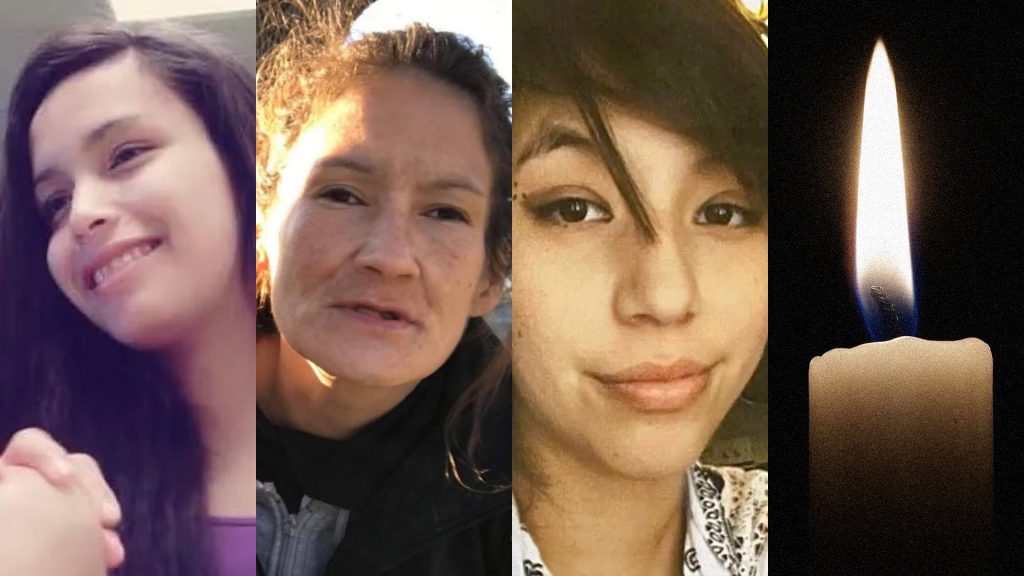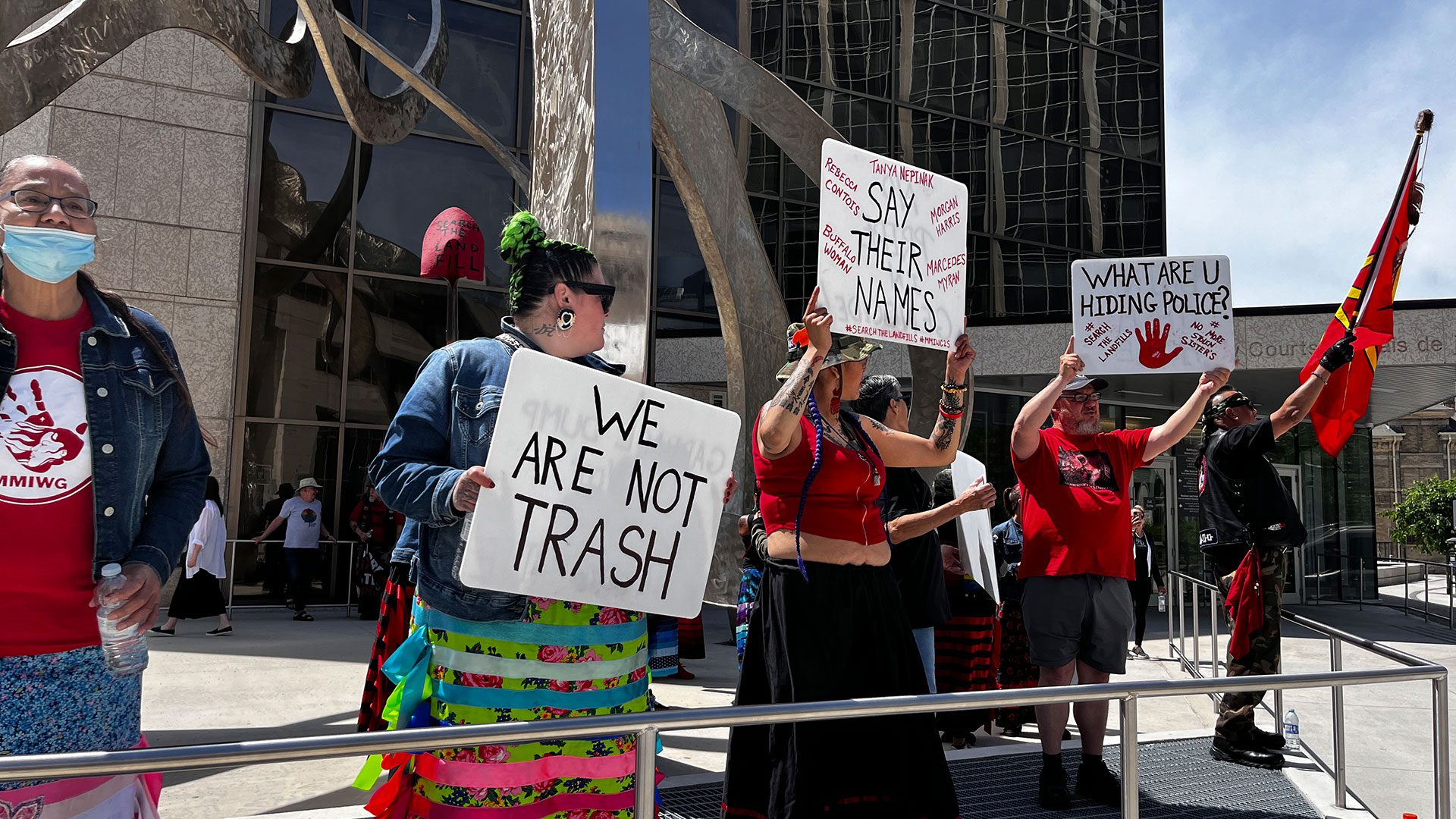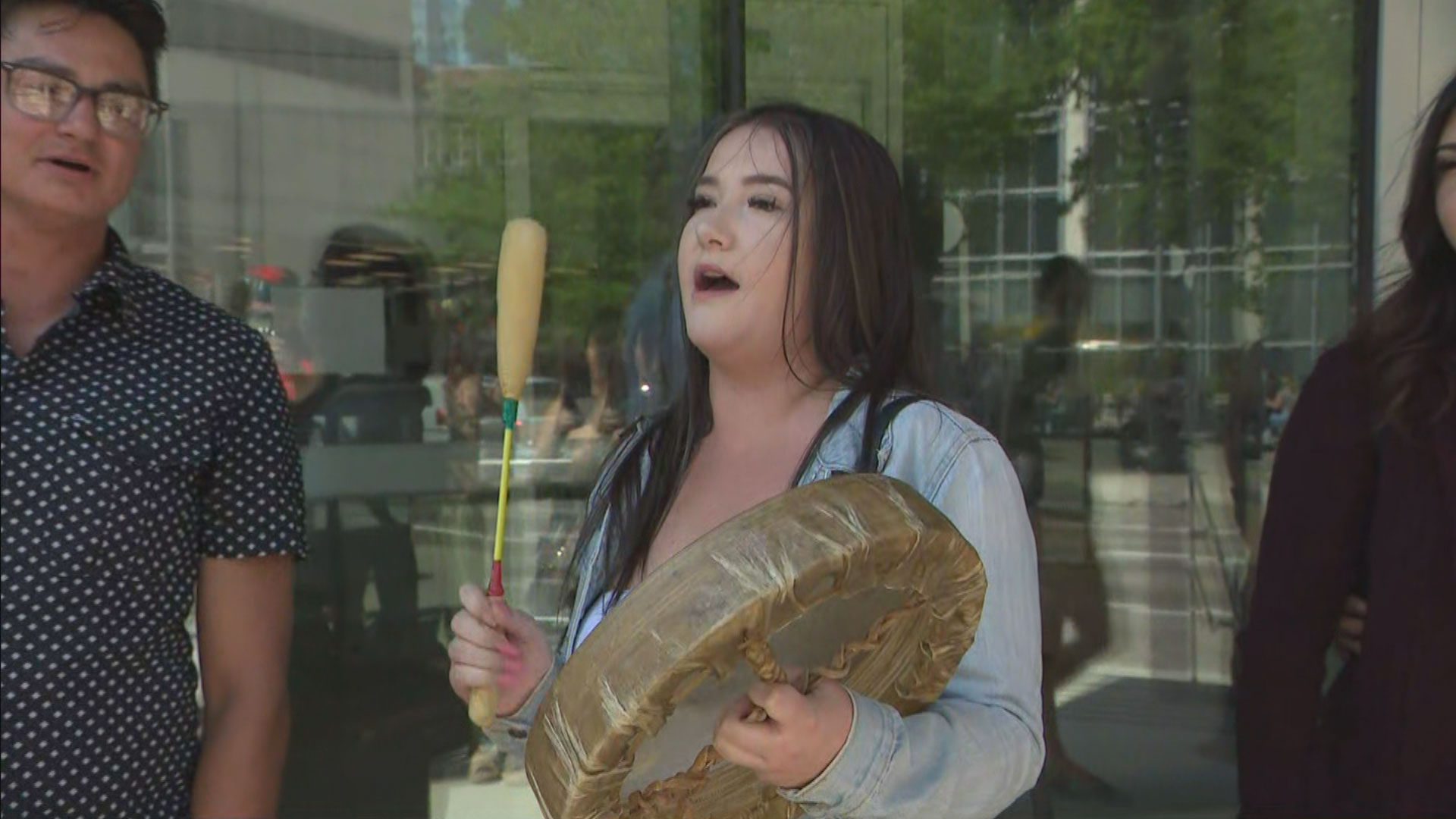
(L to R) Rebecca Contois, Morgan Harris, Marcedes Myran and a candle for Buffalo Woman. Photo: APTN
Warning: This story contains distressing details
The serial murders of four First Nations women in Winnipeg has left a specific kind of grief behind, say chiefs of five reserves in Manitoba who contributed community impact statements to the court.
The chiefs of Long Plain, O-Pipon-Na-Piwin, Poplar River, Opaskwayak and Cross Lake Nations say no one was untouched by the gruesome crimes committed by Jeremy Skibicki, 37, in the spring of 2022.
“Our community was startled to learn that two of our band members had become the victims of a horrific crime,” said the unsigned statement from Long Plain First Nation where victims Morgan Harris, 39, and Marcedes Myran, 26, were members. “Community members felt helpless and confused as a result.
“First Nations people have a different family structure in that all individuals Morgan’s age are Morgan’s first cousins, and all individuals Marcedes’ age are Marcedes’ first cousins. That’s two generations of band members who are being negatively impacted within the borders of Long Plain,” said Long Plain, located an hour west of Winnipeg.
Victim Rebecca Contois, 24, was from O-Pipon-Na-Piwin, about three hours northwest of Winnipeg.
Read more:
‘I’ll never forget that smug look’: Families have their say in a Winnipeg courtroom
Chief Shirley Ducharme said the murders have “inflicted unimaginable pain – mental, emotional and spiritual – across all First Nations in Manitoba.
“These women were not mere statistics or victims of circumstance; they were our mothers, our sisters, our daughters and they were targeted strategically and mercilessly,” Ducharme noted. “… Their loss has carved a deep, unhealing wound in the heart of our Nations – a wound that will take generations to heal.”
The fourth victim is known as Buffalo Woman or Mashkode Bizhiki’ikwe by the community. She is an Indigenous woman, according to the Winnipeg Police Service, which has yet to identify her.
Their disappearances and death became part of what Indigenous leaders call the “epidemic” of missing and murdered Indigenous women and girls (MMIWG) across the country.
The total number of MMIWG in Manitoba and across Canada is unknown, something Poplar River suggested could be remedied by the creation of a national database to keep track of missing and murdered Indigenous people and a communications system to provide updates to First Nation communities.

“Let this be a way for the judicial system to honour those who have gone on or are still out there to have justice of the most fundamental basis in humanity,” said the statement to Court of King’s Bench Chief Justice Glenn Joyal signed by Coun. Darcy Bruce.
Another chief called for tougher sentences for murderers, to send a strong message that Indigenous lives matter and keep them from returning and terrorizing their communities.
“We are faced with the grim reality that murderers, even those who have taken the life of a child, can be given as little as five years in prison,” said David Monias of Cross Lake. “These individuals are then released back into our communities, free to walk amongst us as if they haven’t destroyed lives. The fear and pain they leave behind are immeasurable.
“I know this pain personally, as I have lost nephews to murder, and their killers still roam free, boasting about evading justice. The justice system, which should protect and serve, instead feels like a cruel joke when the police seem reluctant to even arrest those who break the law.”
At the very least, Skibicki should be designated a “dangerous offender”, suggested Long Plain in its unsigned impact statement.
Read more:
Manitoba premier says Jeremy Skibicki should stay behind bars for life
“… It has become more difficult to trust the justice system because of a history of lenient punishments for those who commit violent crimes against First Nations people,” it said.
Monias agreed.
“When murderers are given leniency, it sends a dangerous message that Indigenous lives are worth less,” he said in his statement. “It emboldens those who might commit violence again, knowing that they may not face severe consequences. Our communities are left to live in fear, questioning if justice will ever be served.”
Skibicki was convicted of four counts of first-degree murder on July 11. On Wednesday, Joyal sentenced him to four mandatory life sentences of 25 years in prison.
Still, Chief Maureen Brown of Opaskwayak said it’s not only up to the legal system.
Listen: Our Relatives is a 5-part APTN News podcast about life on the streets in Winnipeg
“We must confront and rectify the systemic inequalities that endanger Indigenous lives,” she said in her statement. “We call on leaders and policymakers to commit to lasting reforms that protect, respect, and uplift our people.”
Ducharme, of O-Pipon-Na-Piwin, noted the women were preyed upon at or near places they were supposed to feel safe – emergency homeless shelters in Winnipeg.
Skibicki said he stalked the women before luring them to his home, where he physically and sexually assaulted and killed them, then defiled their bodies and disposed of the remains in neighbourhood garbage bins.
The women had mental health and addiction challenges, court heard. Two were on the streets in response to losing their children to the foster care system, their families said.
“We have tirelessly advocated for safe spaces where our most vulnerable First Nations women could find refuge,” said Ducharme. “Yet, these very spaces have been violated, turning into hunting grounds for a predator who exploited their trust and our efforts to protect them.

“This is not just a failing; it is a devastating betrayal, a stark reminder that the safety and dignity of our women are still not guaranteed on this land.”
Also, Ducharme wanted the Parole Board of Canada to heed the devastation Skibicki had caused for any future parole applications.
“The severity of these crimes demands that justice be served without leniency,” she said.
It was the same message delivered by Manitoba Premier Wab Kinew in reacting to the four concurrent life sentences, and 25 years without parole eligibility, the maximum penalty allowed under federal law.
A previous law permitting consecutive sentences with longer periods of parole ineligibility was struck down by the Supreme Court of Canada in 2022.
“The crimes that were committed, the terrible actions which are now part of this person’s vocabulary, means that they can never be free again,” Kinew said Thursday.
“I can commit to you that family members, people such as myself, everyone who’s been touched by this terrible sequence of crimes and the humanitarian cries for help from the families, will never forget. And we will be there to remind whoever is entertaining (parole) in the future.”
Support is available for anyone affected by these reports and the issue of missing and murdered Indigenous people. Immediate emotional assistance and crisis support are available 24 hours a day, seven days a week through a national hotline at 1-844-413-6649.









